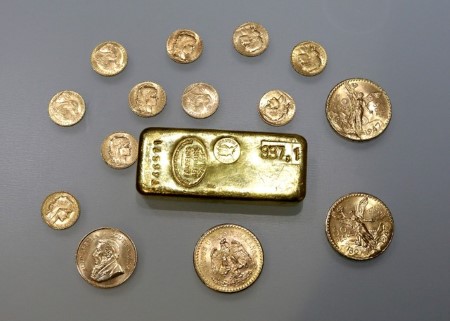




Philippines Trade Update: Imports weaken on tepid demand
 DOWNLOAD
DOWNLOAD

Policy Rate Updates: BSP outlook — cloudy with a chance of rate cut
 DOWNLOAD
DOWNLOAD

January Economic Update: Growth slows, prices rise
 DOWNLOAD
DOWNLOAD


Gold bound for dismal quarter on aggressive rate hike fears

Sept 30 (Reuters) – Gold rose to a one-week high on Friday as the dollar retreated from recent highs but bullion was headed towards its worst quarter since March last year, buckling under fears of impending large interest rate hikes by the US Federal Reserve.
Spot gold was 0.1% higher at USD 1,661.89 per ounce by 1:45 p.m. EDT (1745 GMT) and gained 1.1% so far this week.
US gold futures settled 0.2% higher at USD 1,672.
“The gold market’s at an area where we can see some movement higher… (but) that’s all dependent on what the dollar does and rates going into the weekend,” said Daniel Pavilonis, senior market strategist at RJO Futures.
Gold is down 8% for the quarter so far. This would also be bullion’s sixth straight monthly drop, its longest streak of monthly declines in four years.
Gold showed muted reaction after Russian President Vladimir Putin signed treaties to annex four Ukrainian regions partly occupied by his forces.
“We’re really facing high-inflation environment, which is ultimately the reason why the Fed has to be so aggressive. These macro forces really sap investment appetite from gold and so investors aren’t looking at the metal as proper safe haven hedge,” said Daniel Ghali, commodity strategist at TD Securities.
Rising interest rates dim bullion’s appeal as they increase the opportunity cost of holding the non-yielding asset.
Spot silver added 1.1% at USD 19.02 per ounce, while platinum fell 0.6% to USD 859.88. Both metals were headed for their second straight quarterly decline.
Palladium shed 1.2% to USD 2,174.75 per ounce, and has gained about 12.3% so far this quarter.
“We expect PGMs to perform better than other metals as the prospects of the auto sector improve in 2023, particularly demand for auto catalyst metals platinum and palladium,” analysts at ANZ said in a note.
“Issues with mine supply from South Africa mean that both platinum and palladium markets are likely to remain relatively tight.”
(Reporting by Kavya Guduru in Bengaluru; Editing by Marguerita Choy and Shailesh Kuber)
This article originally appeared on reuters.com





 By Reuters
By Reuters